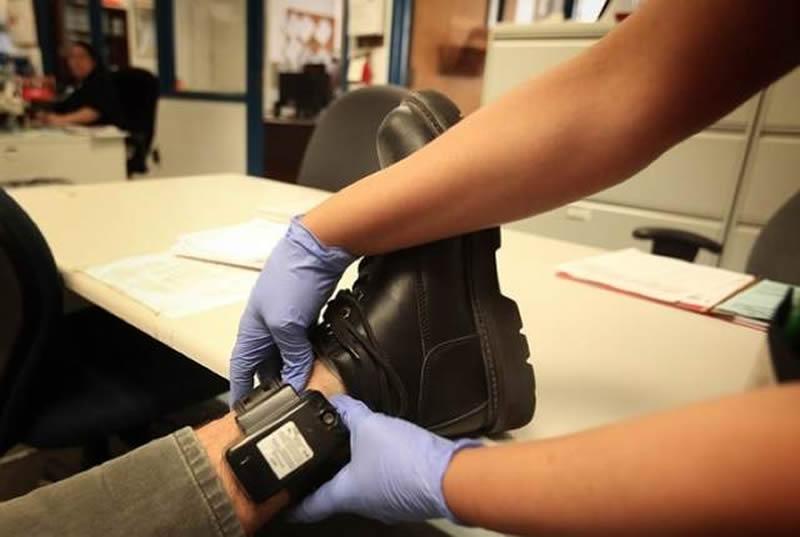The House Arrest Alternative Sentencing Program (HAASP) was established to provide a sentencing option for DWI offenders. Since that time, the program has expanded to accept persons convicted of all offense types and pretrial defendants requiring intensive supervision. HAASP offers enforcement of curfew requirements through the use of an “active” monitoring system. Participants on the HAASP Program are equipped with an electronic monitoring device “bracelet” which transmits a continuous signal to a central monitoring unit.
Eligibility
Residence within a 50 mile radius of Anne Arundel County; AND,
- Must have and maintain acceptable telephone and electrical services; AND,
- Ordered to the program by the District or Circuit Court of Anne Arundel County under one of the following conditions
- As a condition of sentence to the Anne Arundel County Department of Detention Facilities or,
- As a condition of pretrial commitment;
- As a condition of pretrial release (See Pretrial Services, page 30).
- Approved by the Superintendent or ORCC or JRDC Correctional Facility Administrator pursuant to Correctional Service Article 11-703.
Fees
$10.00 per day
Program Elements
The elements of house arrest vary depending on the means by which an offender is placed on the program:
- Condition of Sentence to Anne Arundel County Department of Detention Facilities (AACDDF)
- Offenders are committed to the custody of the AACDDF for a term not to exceed 18 months, with a stipulation that all or part of the sentence be served on the HAASP. House Arrest is typically used as a sentencing option for offenders who require greater restriction than probation, but less than that afforded by incarceration in a secure facility.
The following are standard program elements, which may be expanded or amended by the Court. Modification or other, special conditions should be specified on the Defendant Trial Summary (District Court) or Commitment Attachment (Circuit Court).
The court, State’s Attorney’s Office, Division of Parole and Probation are advised in writing in the event of program removal.
Self-report to the House Arrest office as ordered by the court. If offender had been detained pretrial, the defendant may remain in custody with intake to occur on the next business day to ensure continuity of supervision.
24 hours unless activities are verified by case manager or otherwise specified by the Court.
Allowed for sentenced participants unless prohibited by the court.
Conducted on a regular basis.
Allowed as Ordered by the Court or as determined by House Arrest staff.
Conducted on a random basis or for cause or suspicion.
Conducted on participants for cause or suspicion.
Required weekly or twice per month, depending on assigned level of supervision.
Commitment to the AACDDF
- HAASP Defendant Trial Summary (District Court)
- Commitment Attachment (Circuit Court) detailing conditions of House Arrest
Sentence is reduced by one day for every day of successful participation (Day-for-Day).
Addressed through the AACDDF disciplinary process. The participant is instructed to report to the Correctional Center where a Notice of Infraction is issued and a disciplinary hearing is held within 96 hours excluding weekends and holidays. Guilty findings result in imposition of graduated sanctions based on the seriousness of the rule violation. Typical violations and resultant sanctions include:
- Absence from authorized locations or activities - removal from HAASP and loss of diminution credits;
- Positive urinalysis/breathalyzer - removal from the program and loss of diminution credits;
- Absconding or failing to report to the Correctional Center when directed to do so - charged criminally with escape from confinement, removal from HAASP upon arrest or return to custody and loss of diminution credits.
Defendants may be “incarcerated” on House Arrest as a condition of probation while serving the suspended portion of a sentence. The total term of “incarceration,” to include time in actual confinement as well as on House Arrest, may not exceed 18 months. Violation of program rules is reported to the supervising Probation Agent and the Court.
Defendants are Committed Pending Hearing to AACDDF on a “no-bond” status with the stipulation that they live at home pending trial.
Commitment to AACDDF ordering that the defendant be held without bond and stipulating house arrest pending trial.
Prohibited unless authorized by the Court
Scheduled testing
None
5 days Good Conduct Time for every 30 days applied against future sentence, if any.
Defendant is ordered to return to the Correctional Center for appropriate disciplinary action, served a Notice of Infraction and the court is notified upon the completion of Disciplinary Hearing via letter.
The Court may release a defendant to the supervision of the Pretrial Services Supervised Release Unit (SRU) and order that he or she be under house arrest pending case disposition (see page 30-32). NOTE: compliance with curfew and restrictions on movement are enforced electronically, courtesy of House Arrest Program staff. Violations are reported to the SRU, which is the supervisory authority for defendants on house arrest as a condition of pretrial release. Defendants on house arrest as a condition of pretrial release are not charged a fee.
Correctional Services Article 11-703 was amended effective -01 to authorize the Superintendent to place eligible Work Release inmates on House Arrest upon meeting specified AACDDF criteria. Program elements are the same as the condition of sentenced participants. Eligible inmates may progress to this status for the last 60 days of their sentence.

